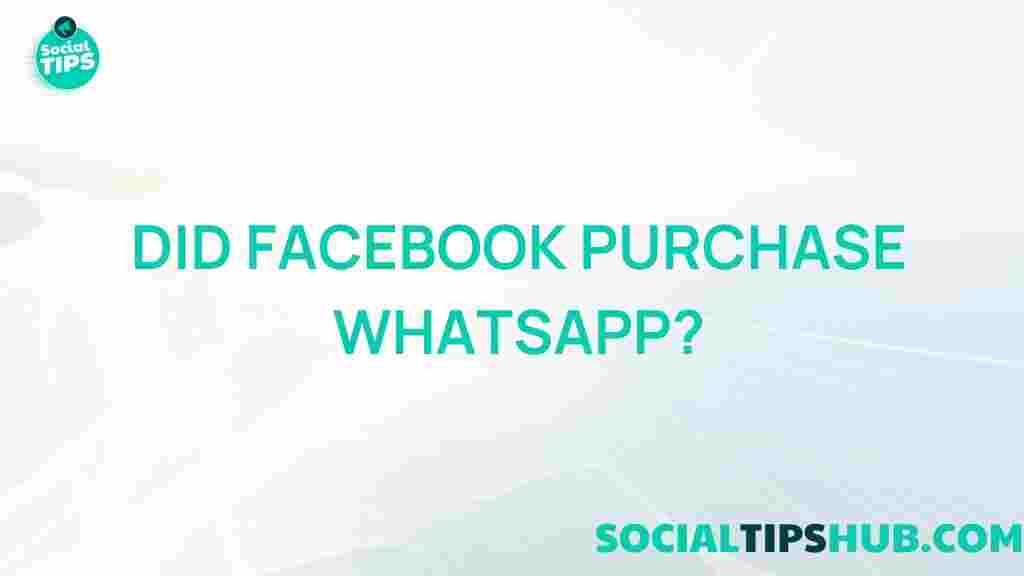Facebook: The Untold Story Behind Its Acquisition of WhatsApp
In 2014, the tech world was buzzing when Facebook announced its acquisition of WhatsApp for a staggering $19 billion. This monumental deal not only reshaped the social media landscape but also revealed a deeper strategy at play within Facebook. Understanding the untold story behind this acquisition is essential for grasping the motivations and future ambitions of one of the largest social media platforms in the world.
Introduction
WhatsApp, a messaging platform that started as a simple text messaging service, had grown exponentially since its launch in 2009. By the time of its acquisition, it had over 400 million active users and was becoming increasingly popular across the globe. This article will delve into the details of how and why Facebook decided to acquire WhatsApp, what the acquisition meant for both companies, and the impact it has had on the industry.
The Landscape Before Acquisition
To appreciate the significance of Facebook‘s decision to acquire WhatsApp, it’s essential to understand the competitive landscape at the time:
- Growing Competition: Messaging apps like WeChat and Viber were gaining traction, threatening Facebook‘s market share.
- User Engagement: Users were increasingly looking for platforms that offered private messaging, leading to a decline in Facebook‘s overall engagement.
- Shift in Communication: As users moved towards mobile messaging, Facebook needed a strategy to capture this audience.
Key Motivations Behind the Acquisition
Several factors influenced Facebook’s decision to acquire WhatsApp:
- User Base Expansion: Acquiring WhatsApp meant immediately gaining access to a vast user base. The platform was not just popular in the U.S.; it was a global phenomenon.
- Data and Insights: With access to WhatsApp’s data, Facebook could enhance its advertising strategies and improve user targeting.
- End-to-End Encryption: WhatsApp’s commitment to user privacy aligned with Facebook’s need to enhance security measures on its platform.
The Negotiation Process
The road to acquisition was not straightforward. Here’s a step-by-step look at how the negotiation unfolded:
Step 1: Initial Discussions
Early conversations between Facebook and WhatsApp began in late 2013, primarily focused on potential partnerships. However, it quickly became evident that a merger could be more beneficial.
Step 2: Valuation and Offer
WhatsApp co-founder Jan Koum was adamant about maintaining the integrity and independence of WhatsApp. Despite this, Facebook‘s offer was attractive, valuing WhatsApp at $19 billion, which included cash and stock options.
Step 3: Sealing the Deal
After extensive negotiations, WhatsApp’s leadership accepted Facebook‘s offer in February 2014, leading to a formal announcement that sent shockwaves through the tech community.
What the Acquisition Meant for Facebook
The acquisition had profound implications for Facebook:
- Strengthened Position: By acquiring WhatsApp, Facebook solidified its dominance in the social media space and diversified its offerings.
- Expansion into Messaging: WhatsApp’s features allowed Facebook to tap into the growing messaging market, a crucial aspect of modern communication.
- Brand Recognition: Associating with a beloved platform helped enhance Facebook’s reputation among users who were skeptical about privacy issues.
Impact on WhatsApp
The acquisition also affected WhatsApp significantly:
- Funding for Growth: With Facebook’s resources, WhatsApp was able to scale quickly, adding new features and expanding its infrastructure.
- Focus on Privacy: WhatsApp maintained its original ethos of privacy and user-centric communication, which reassured its user base.
- Integration of Features: WhatsApp was able to introduce features like voice and video calling, enhancing user engagement.
Challenges Post-Acquisition
Despite the apparent success, challenges arose following the acquisition:
- User Concerns: Users were initially worried about how their data would be used by Facebook, prompting both companies to address privacy issues transparently.
- Regulatory Scrutiny: The acquisition drew attention from regulators concerned about monopolistic practices in the tech industry.
- Cultural Differences: Merging the cultures of a startup and a large corporation like Facebook was a complex process that required careful management.
Long-Term Effects on the Messaging Industry
The acquisition has had lasting impacts on the broader messaging landscape:
- Competitive Strategies: Competitors had to adapt their strategies to stay relevant, leading to innovations in features and user engagement.
- Market Trends: The focus shifted toward privacy and security, with many messaging apps introducing end-to-end encryption.
- Influence on Advertising: Facebook leveraged WhatsApp’s user base for targeted advertising, shaping new monetization strategies.
Troubleshooting Tips for Users
As with any major platform changes, users may experience issues. Here are some troubleshooting tips for WhatsApp users:
- Login Issues: Ensure your app is updated and check your internet connection. If you still can’t log in, try resetting your password.
- Notification Problems: Check your device settings to ensure notifications are enabled for WhatsApp.
- Privacy Settings: Familiarize yourself with the privacy settings available in the app to manage who can see your information.
Conclusion
The acquisition of WhatsApp by Facebook was not just a financial transaction; it was a strategic move that changed the landscape of social media and messaging applications. It highlights the importance of adapting to user needs, maintaining privacy, and fostering innovation. As both platforms continue to evolve, the implications of this acquisition will be felt for years to come.
For more insights into the tech industry, visit our blog. To learn more about WhatsApp’s features, check out the official WhatsApp website.
This article is in the category News and created by SociaTips Team
